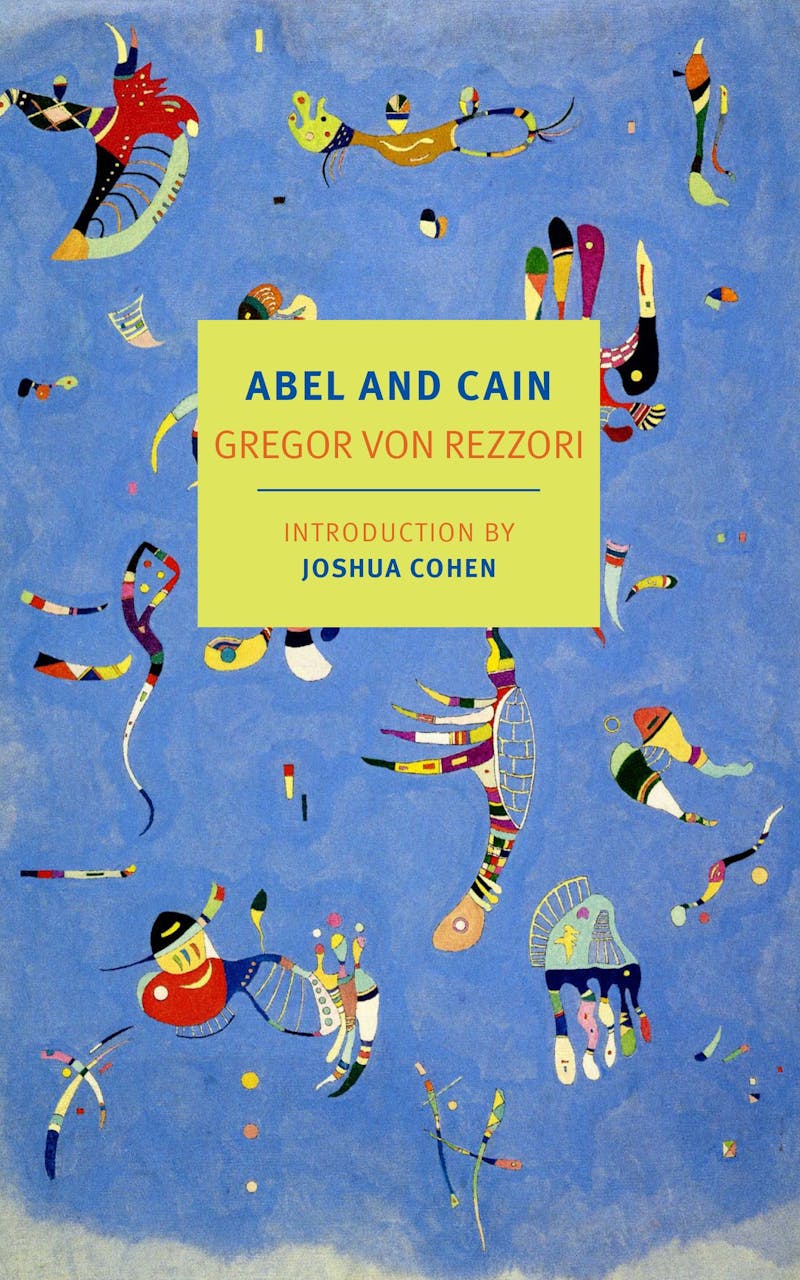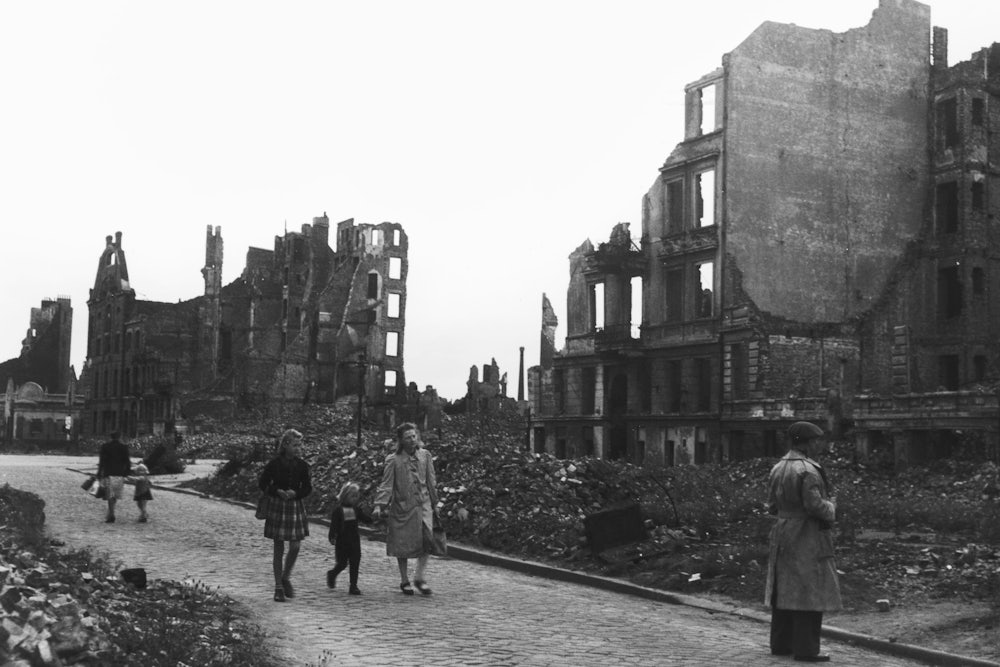If you put a gun to my head and asked me to describe Gregor von Rezzori’s Abel and Cain in three sentences, this is what I would answer: Murder. Murder. Murder. First-, second-, and third-degree: premeditated, unpremeditated, involuntary. Fratricide, sororicide, parricide. Genocide, historicide, deicide.

Every -cide suffuses every aspect of this grimly remarkable book, from its title that memorializes the victim and perpetrator of the first murder on Biblical record, to its recurrent evocations of Nazi death-camps and German cities under Allied bombardment. Then there are the book’s myriad less-literal killings, its Gedankenmorde or “thought-murders,” such as: the “murder” committed by writers when they write their family and friends into their books, and the “murder” of writers and books committed by their agents, editors, publishers, and introducers. Not to forget the “murder” of books by their screen adaptations, and the “murder” of literature itself by film and television.
At a Paris café on the eve of 1968, a Galician Jew turned American literary agent named Brodny meets an initially unnamed German-language novelist and asks him for “his story,” which the novelist takes to mean “the story of his life,” but told in the Hollywood-style: short enough to be sketched on a napkin, quick enough to be pitched in an elevator. In the film business, the suggestively psychoanalytic term for this type of synopsis is “a treatment,” and the writer is resistant, to say the least. Meanwhile, the agent’s not asking anymore. He’s yelling, “Tell me the story in three sentences!”
The writer is so insulted by this demand for abbreviation, abridgment, encapsulation, truncation, etc., that he ditches the agent, dashes off to his hotel, and, forgetting his writer’s block, dashes off this book or books—in which he calls himself “Aristides Subicz,” though it’s unclear whether that name is his “real” name, or a pseudonym assumed for his scriptwriting hackwork, or a survival-identity assumed during wartime. (Aristides was an Athenian statesman. Subicz was the name of an ancient ruling house of Dalmatia, which spanned present-day Croatia and Bosnia.)
Of course, the more the writer Subicz explains to the agent Brodny why his—Subicz’s—life can’t be condensed for film, the more he ends up recounting that life itself: He narrates his birth in 1919 in Bessarabia, just after it had become annexed to Romania; his Austro-Dalmatian mother, who drags him around the Côte d’Azur as she flits between lovers, whom he calls “uncles” (“Bolivian tin-mine owners, Argentine cattle breeders, Irish beer kings, Dutch petroleum magnates,” and a Romanian nobleman with Ottoman roots—“Uncle” Ferdinand—who might, but might not, be the boy’s father); his mother’s suicide, and his subsequent adoption by his mother’s estranged family in squalid, disembourgeoised interwar Vienna; his schooldays rivalry with chronic masturbator-cum-convinced Nazi Cousin Wolfgang; his affair with a Jewish woman named Stella and his friendship with her husband, John, a British diplomat and spy, who introduces him to haute society just as it’s collapsing.
With the Anschluss, Subicz returns to Romania to serve in the Romanian army, only to fairly immediately desert and attempt a crazy reunion with Stella—who’s found refuge in Switzerland—in Berlin. Subicz waits for her, but she never comes; the SS has dragged her off to the gas and ovens. The end of the war finds Subicz in Hamburg, a city that had just been leveled in what was then the heaviest assault in the history of aerial warfare. There, Subicz sets to work as a novelist, but with Reichsmarks worthless and Deutschmarks scarce—and a wife, and a son, and mistresses, and a prostitute habit—he takes on sideline gigs scribbling scripts for the “piglets” of the German film industry, eager to revive the glory, if not the aesthetics, of Weimar’s Ufa.
The major postwar presence in Subicz’s life is a man named Johannes Schwab, who like Subicz is a frustrated writer, but unlike Subicz isn’t cheap enough for film, and so he goes to work as a book-editor. He is, in fact, Subicz’s book-editor—meaning that he vouched for Subicz’s talent and got his author a series of advances. Needless to say, not a single page has ever come in.
Schwab, who also lives in Hamburg is the German “brother” to Subicz’s errant “Austrian.” Schwab’s first appearance is more like a diagnosis:
He was wearing a heavy turtleneck sweater (not a Hanseatic outfit but, with corduroy slacks and a beret, the guild costume of German intellectuals in the fifties, which costume he carried on into the sixties―typical of people who are behind the times but consider themselves avant-garde!).
Two decades of waiting for Subicz’s pages have taken their toll. Arriving in Paris to meet Subicz, Schwab is professionally, aesthetically, philosophically, and sexually adrift, and he confesses as much, between room-temperature gin and tonics, cigarettes, and pills. He’s not onboard with the Wirtschaftswunder, the Federal Republic’s economic miracle, but he needs its salary and perks; neither is he down with the burgeoning student movements, but he needs their excesses and their purpose. Subicz should be worried, but men who’ve survived mass slaughters tend not to worry too much about substance abuse and certainly don’t stage interventions—at best, they get wasted themselves and pick up the tab, which is exactly what Subicz does. Schwab returns to Germany and binges to death. Subicz calls it a suicide, which is just the polite society term for another homicide he’s gotten away with.
Indeed, in Subicz’s narration, which takes up the two sections or “folders” labeled A and B, Schwab is presented as the Abel to Subicz’s Cain: Subicz “kills” Schwab by abandoning him for the movies, or by failing to write a book that brings Schwab back into esteem at his publishing-house, which is under increasing pressure to make profits as its media-conglomerate parent becomes a global hegemon.
Yet it becomes increasingly feasible that the roles can be reversed, and that Schwab might be the Cain to Subicz’s Abel: Schwab “kills” Subicz by becoming too dissolute to edit him, or by having earlier championed Nagel, a famous but plodding German writer whose success has stymied Subicz (Nagel is a composite, but also the Nobel Laureate and Waffen SS member, Günter Wilhelm Grass). Another way to read the titular brothers is through nationality: Subicz’s Austria-Hungary is Abel, murdered by Germany’s Cain, which fostered Nazism and foisted it on Europe. Or else: Schwab’s Germany is Abel, murdered by Austria-Hungary’s Cain, Hitler’s native land.
It doesn’t ultimately matter which role any of them plays, however: At the end of the book, all of these characters, and all of these nations, are dead.
When Gregor von Rezzori died, in 1998, he still wasn’t finished with this material. In 1976, he’d published what he called the introductory pneuma (which is framed by the two Paris meetings, the interview with Brodny, and the bender with Schwab), and folders A and B, in a book called Der Tod Meines Bruders Abel, which was translated in 1985 as The Death of My Brother Abel. Folder C was published posthumously in 2000 as Kain (Cain) and never translated. Here, both volumes are together in English for the first time, and the effect is to make the give-and-take between Subicz and Schwab into something closer to a forking or branching: They’re the two lives, or deaths, that might’ve been von Rezzori’s.
Gregor Arnulph Hilarius d’Arezzo, known to all as Grisha, was born not after World War I, like his two “brothers,” but just at its start, in 1914—in Czernowitz, then the capital of the Duchy of Bukovina, later a major city in the Kingdom of Romania, and now a provincial city in Ukraine. His family were Sicilian aristocracy from Ragusa, who served as Habsburg officials. Grisha inherited their cosmopolitanism and became fluent in seven languages. His war was spent initially with the Romanian army, and then on false papers in Berlin, where he repeatedly tried to write about what he was witnessing. But every attempt at documenting his present led him to the past, and he eventually produced a distinguished oeuvre of cruel, beautiful autobiographical novels about his Empire childhood and teen years. Predictably, they were mostly ignored in Germany in favor of the lighter fare he wrote to pay the bills (his four-volume An Idiot’s Guide to German Society, and, yes, his scripts for film and television).
German letters didn’t know what to do with him: He wrote in German, but wasn’t German; not even the Austrians would claim him (not that he wanted to be claimed by them). His foreignness—indeed, his official statelessness, for a period—along with the splendeurs of his style alienated him from the Trümmerliteratur movement (Rubble Literature, the direct and even rudimentary immediately-postwar German literature that tried to objectively describe, not subjectively evaluate, the contemporary scene, as a way, perversely, of mitigating its readership’s war trauma), and he was too much of a nostalgist for the Vienna of Hermann Broch, Robert Musil, Joseph Roth, and Stefan Zweig to take part in the explicitly experimental Gruppe 47 (a group of novelists, poets, and playwrights that met between 1947 and ‘67, and included, at various times, and among others, Ingeborg Bachmann, Heinrich Böll, Peter Handke, and Uwe Johnson).
It was a mixed blessing that Grisha’s nostalgia—rather, his extreme alternation, or juxtaposition, of warm sentiment and violent incident—was most appreciated in America, which perhaps also appreciated how much he relished denigrating America, calling it stupid, crass, incurious, and puritanical. He enjoyed blaming the fact that he had to support himself with hackwork on the Americanization of postwar European culture; but then he always had a sly sadist’s understanding of the American intellectual’s appetite for masochism (perhaps because it was appropriated from the émigré Jewish intellectual’s appetite for masochism). Almost all of his other books were set in memory, but this book—or books—is about memory, how it’s made and remade, sequelized and enkitsched; how memory, as it passes out of the family, out of the community, out of the nation, and then finally out of the age, inevitably is generalized and broadened for mass consumption. He was a keen believer that the larger the audience for something, the dumber that something becomes—and the more ideologically correct it becomes too. Whether we believe that dictum or not, we keep proving it truer and truer in the third millennium of Christ—with our partisan “news” as much as with our anti-literary “media properties,” and especially with our online interactions.
Abel and Cain is of a different tradition. It’s one of those vast masterpieces for the chosen few. Which means it’s destined to endure, like Journey to the End of the Night, Death on Credit, and Gravity’s Rainbow. Von Rezzori is a Céline with a sense of humor and a conscience. He’s a Pynchon who has outgrown the movies.
This article is adapted from the introduction to Abel and Cain, out in June from NYRB Classics.
